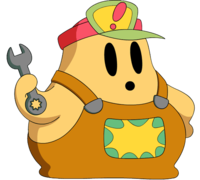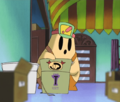Gangu
| ||||||||||||||||
|
| ||||||||||||||||
Gangu[1] is a Cappy and resident of Cappy Town in the anime series Kirby: Right Back at Ya!. Gangu is an exceptionally portly Cappy who runs the toy store in the town. In addition to receiving toys from external shipments, he is also capable of making them himself.
Gangu is recognizable by his short and stout physique, along with his orange overalls and accented cap. Through the series, he is not shown to be particularly clever, but he is always helpful and cares about his customers. In his first starring role in the episode Kirby's Pet Peeve, he attempts to make a replacement Electronic Pet for Kirby after the original is lost at no charge, but ultimately decides against presenting it to Kirby, since nothing he could make would be a suitable replacement. In Snack Attack - Part I, he gets an idea to collaborate with Tuggle to repurpose their poorly-selling merchandise by combining them together into a hit product. This is later used against the two when Night Mare Enterprises sends their own monstrous version of that same product to their doorstep.
Filmography[edit]
- Main article: Gangu/filmography
Gangu appears in a majority of episodes in Kirby: Right Back at Ya!, though his role is very often incidental. For a full list of Gangu's episode appearances along with details of his role in each one, see his filmography page.
Gallery[edit]
Animator sheet comparing heights of principal characters (Kirby alongside the Cappy Town villagers)
Names in other languages[edit]
| Language | Name | Meaning |
|---|---|---|
| Japanese | ガング gangu |
Gangu Gangu's name is a formal, unusual but accepted onyomi reading of the kanji compound word 玩具, which is almost always instead written and read as おもちゃ (omocha). The word simply means "toy". |
References
- ↑ Spelling taken from this script sheet






